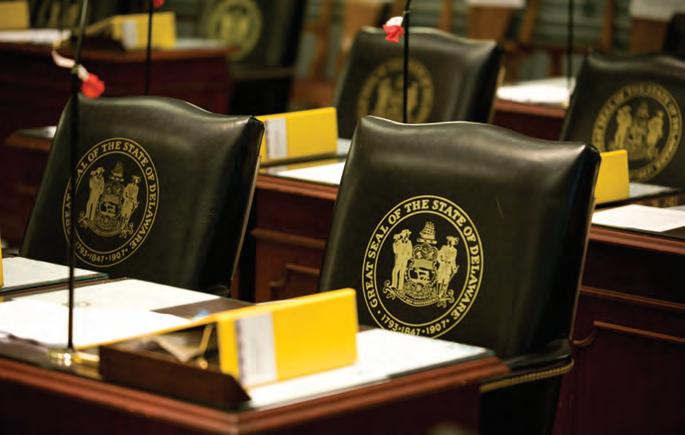
3 minute read
Legislative Priority
Together Through Transition: Insights on the 153rd Session
BY TYLER MICIK
THE FIRST LEG of the 153rd session of the General Assembly concluded early in the morning of July 1. One could characterize this session as transitional. It began with a degree of uncertainty as new leadership took shape, a new governor settled into office, and a significant number of newly elected legislators began to navigate their roles amidst shifting local, national, and global dynamics.
What started as a relatively slow legislative pace quickly picked up with the introduction of Senate Bill 21 (later substituted with SS 1 for SB 21), which updated Delaware’s General Corporation Law with the intent to preserve the state’s competitive edge as the premier jurisdiction for business incorporation. The proposal stirred debate on a national level but was signed by the governor one month later. Ultimately, more than 400 bills were introduced during the 2025 legislative session.
The State Chamber prioritized 29 key bills by taking formal positions, gathering feedback, testifying at hearings, and proposing amendments to ensure the unified voice of Delaware’s business community was heard.
Some significant bills worth highlighting include personal income taxes (HS 2 for HB 13), pay transparency (HS 2 for HB 105), DNREC’s permitting fees package (HB 175), and a package of utility bills (SB 59, 60, and 61). Through collaboration with a broad range of stakeholders and policymakers, the State Chamber defeated changes to Delaware’s personal income tax structure, secured amendments to the pay transparency bill to more accurately reflect the operational realities of small businesses across the state, and negotiated more measured fee increases within DNREC’s proposal — predicated upon Secretary Patterson’s commitment to enhancing permit processing times and fostering a culture shift within the department. These proposals are proof that when the business community and policymakers thoughtfully engage with each other, the end result is more balanced legislation.
The General Assembly also passed a $6.5 billion operating budget for fiscal year 2026 (HB 225), along with a $37 million one-time supplemental budget (HB 226), which was signed by the governor. This represents a 7% increase over the current fiscal 2025 operating budget and nearly 25% budget growth over the past three years.
Some policymakers voiced concerns about the sustainability of this growth, warning that if revenues soften in the future — as the Office of Management and Budget has recently presented — the state may need to rely heavily on its Budget Stabilization Fund ($469.2 million) and Rainy Day Fund ($365.4 million), potentially exhausting them in the process.
Following a special session on Tuesday, August 12 focused on concerns surrounding the recent property reassessment process, the General Assembly is now in recess until Jan. 13, 2026. This fall will be an important time to continue discussion on bills that are still pending consideration and will carry over to next year. It’s also a time for the business community to identify challenges and problems so that ideas for solutions can be explored and proposed.
The State Chamber will be sending out its annual survey around the timing of this article to identify key issue areas and help build our 2026 policy priorities. Feedback from our members ensures topics like regulations, workforce, the cost of doing business, health care, and more continue to be prioritized.
Tyler Micik is the Delaware State Chamber of Commerce’s director of public policy and government relations.










